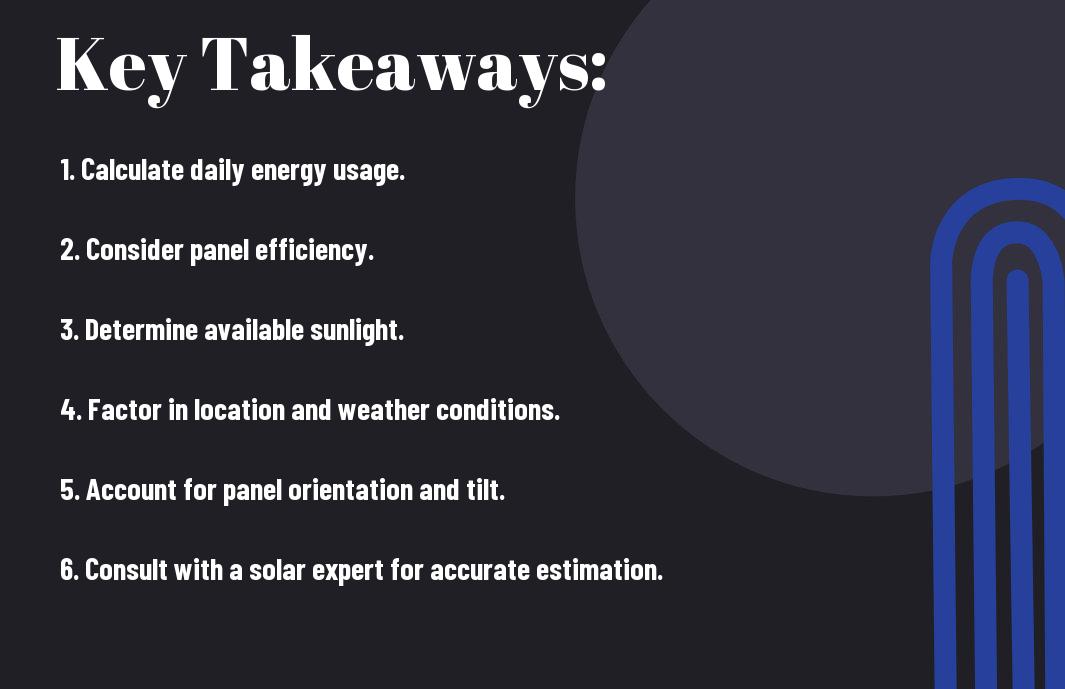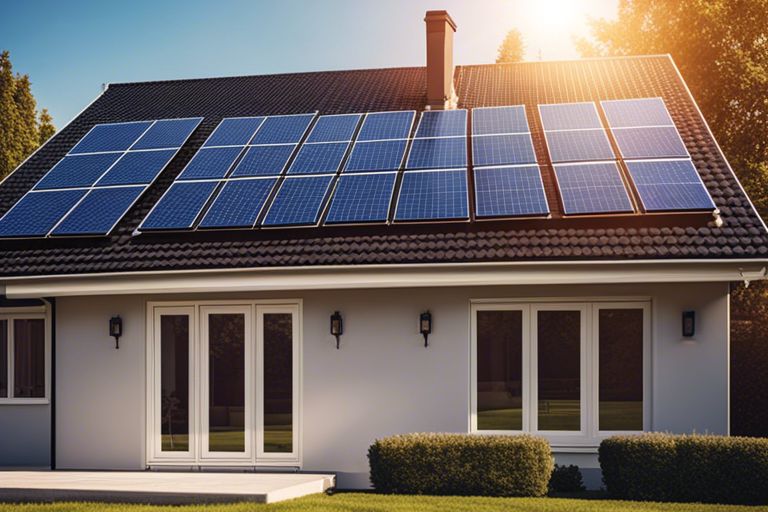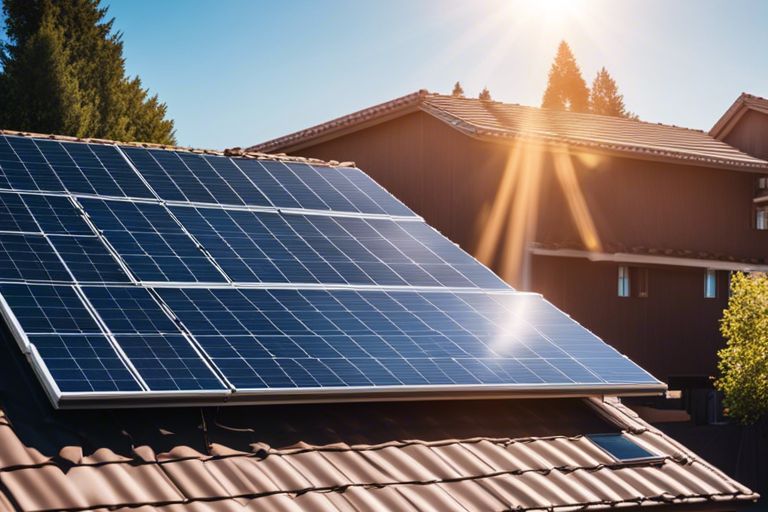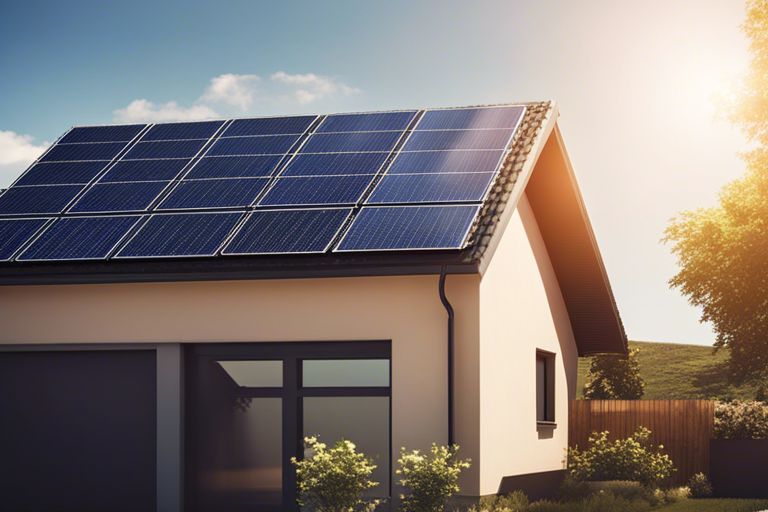Many homeowners wonder how many solar panels are needed to power their home efficiently. To determine the right amount for your home, you need to consider factors such as your energy consumption, roof size, and location. If you’re curious about finding the ideal number of solar panels for your home, you can use the solar panel calculator on How Many Solar Panels Do I Need For My Home In 2024? to get a personalized estimate.
Key Takeaways:
- Calculating Energy Needs: To determine the number of solar panels needed to power a home, first calculate the average daily energy consumption in kWh.
- Solar Panel Efficiency: Consider the efficiency of the solar panels, which impacts the number required. Higher efficiency panels may require fewer in number.
- Location & Sunlight: The location of the home and available sunlight will also affect the number of solar panels needed. Areas with more sunlight may require fewer panels to generate the same amount of energy.


Determining Your Energy Needs
The first step in determining how many solar panels you need to power your home is to calculate your energy needs. This involves understanding the amount of energy your household consumes on a daily basis.
Calculating Your Daily Energy Consumption
Consumption is the key factor in determining the number of solar panels required. To calculate your daily energy consumption, you can look at your utility bills to check your average daily usage in kilowatt-hours (kWh). You can also use energy monitoring devices to track your real-time energy usage. By analyzing this data, you can get a better idea of how much energy your household consumes daily, which will help you determine the size of the solar panel system you need.
Factors Affecting Energy Usage
For accurate calculations, it’s vital to consider various factors that can affect your energy usage:
- The size of your home and the number of appliances you have
- The energy efficiency of your appliances and home insulation
- Climate and weather conditions in your area
The efficiency of your solar panels in converting sunlight into electricity will also impact the number of solar panels needed. The better the efficiency, the fewer panels you’ll require. Usage patterns, like peak usage times and off-peak usage, can also influence your energy needs. The more energy-efficient and mindful you are in your consumption habits, the more you can optimize your solar panel system.
Assessing Your Solar Potential
Even before you start calculating how many solar panels you need, it’s necessary to assess your home’s solar potential. This step will help you determine if your roof is suitable for solar panel installation and how much energy you can expect to generate.
Evaluating Your Roof’s Solar Exposure
Roofs with good solar exposure are typically south-facing, as they receive the most sunlight throughout the day. East and west-facing roofs can also be viable options, but they may generate slightly less energy. Take a look at your roof during different times of the day to see how much sunlight it receives. If your roof is shaded by trees or buildings for a significant portion of the day, it may not be ideal for solar panel installation.
Considering Shading and Obstructions
For an accurate assessment of your solar potential, consider any shading or obstructions that may affect your roof’s exposure to sunlight. Trees, nearby buildings, chimneys, or vents can cast shadows on your roof, reducing the amount of sunlight that reaches your solar panels. It’s crucial to take these factors into account when evaluating the suitability of your roof for solar panel installation.
Exposure to direct sunlight is crucial for maximizing the energy output of your solar panels. By minimizing shading and obstructions on your roof, you can ensure that your solar panels receive ample sunlight to generate the electricity needed to power your home efficiently.

Sizing Your Solar Panel System
Calculating the Required System Size
Despite the complexity of determining the number of solar panels needed to power your home, you can start by looking at your electricity usage. Your energy bills will provide you with the necessary information to calculate how many kilowatt-hours (kWh) you consume on average per day. By dividing this by the average sunlight hours in your location, you can estimate the daily energy your solar panels need to produce.
Accounting for Energy Efficiency and Losses
Calculating the required system size is just the first step. Next, you need to account for energy efficiency and losses. This involves considering factors like shading, panel orientation, temperature, and system inefficiencies that can impact the performance of your solar panels. By factoring in these variables, you can ensure that your system is optimized to meet your energy needs effectively.
This process might seem daunting, but it ensures that your solar panel system is tailored to your specific requirements. By taking into account energy efficiency and potential losses, you can maximize the performance of your system and make the most of the solar energy available to you.
Choosing the Right Solar Panels
Once again, as you launch on the journey of selecting the right solar panels for your home, there are a few key factors to consider. The efficiency and wattage of the panels are crucial aspects to take into account.
Efficiency and Wattage Considerations
The efficiency of a solar panel refers to how well it can convert sunlight into electricity. Higher efficiency panels will generate more electricity per square foot than lower efficiency ones. Therefore, it’s important to choose panels with a high efficiency rating to maximize the power generated for your home.
Panel Type and Durability Factors
Pertaining to panel types, there are different options such as monocrystalline, polycrystalline, and thin-film panels. Monocrystalline panels are known for their high efficiency and sleek design, while polycrystalline panels are more cost-effective but slightly less efficient. Thin-film panels are flexible and lightweight, making them suitable for certain installations.
- Consider the durability of the panels in various weather conditions
- Think about the warranty and lifespan of the panels
Wattage is another crucial factor to consider when choosing solar panels for your home. The wattage rating of a solar panel indicates how much power it can produce. Higher wattage panels will generate more electricity, which can be beneficial if you have limited roof space or want to maximize energy production.
Efficiency and Wattage Considerations
- Choose panels with a high efficiency rating
- Consider the wattage of the panels to maximize power generation
Considering Additional Components
Inverters and Charge Controllers
Now, let’s talk about the necessary components that make your solar panel system function efficiently. Any system looking to power your home will require inverters and charge controllers. Inverters are key as they convert the DC power generated by the solar panels into AC power usable by your appliances. Charge controllers, on the other hand, regulate the voltage and current coming from the solar panels to ensure your batteries are charged properly and efficiently.
Mounting and Tracking Systems
Inverters help optimize the performance of your solar panel system by ensuring that the electricity generated is used effectively. They also provide safety features that disconnect the system in case of a power surge or other issues. Mounting and Tracking Systems are equally important as they determine the placement and angle of your solar panels. By mounting them at the correct angle and using tracking systems to follow the sun’s path, you can maximize the amount of sunlight your panels receive, therefore increasing energy production.
Installation and Maintenance
Professional Installation vs. DIY
Keep in mind that setting up a solar panel system can be complex. Unless you have experience with electrical work and roofing, it’s advisable to hire professionals for installation. They will ensure that the panels are positioned correctly to capture the most sunlight and that the system is safely integrated into your home’s electrical grid.
One advantage of professional installation is that reputable companies often provide warranties, giving you peace of mind in case anything goes wrong with your system. While the initial cost may be higher, the expertise and guarantee provided by professionals make it a worthwhile investment.
Ongoing Maintenance and Monitoring
Installation of solar panels is just the beginning of your journey towards sustainable energy use. Regular maintenance and monitoring are crucial to ensure that your system operates at its best. This includes keeping the panels clean, checking for any shading that may have developed over time, and monitoring the overall performance of your system.
Installing a monitoring system can help you track the energy production of your solar panels and catch any issues early on. By staying proactive about maintenance, you can extend the life of your solar panel system and maximize your energy savings in the long run.
Final Words
Summing up, determining the number of solar panels needed to power your home depends on various factors such as your energy consumption, location, and panel efficiency. By calculating your daily energy usage, you can estimate the number of solar panels required to meet your electricity needs. Remember to consider the amount of sunlight your location receives and the efficiency of the solar panels to make an accurate assessment.
Installing solar panels not only reduces your dependence on traditional energy sources but also helps in reducing your carbon footprint and energy costs in the long run. With advancements in solar technology and decreasing costs, transitioning to solar power for your home is an environmentally friendly and cost-effective choice. Consider reaching out to solar energy professionals to get a customized assessment of your home’s energy needs and the number of solar panels required to power it efficiently.
FAQ
Q: How do I determine how many solar panels are needed to power my home?
A: The number of solar panels required to power your home depends on your energy consumption, the efficiency of the solar panels, and the amount of sunlight your location receives. A solar installer can assess your energy needs and recommend the appropriate number of panels for your home.
Q: What factors should I consider when calculating the number of solar panels needed for my home?
A: Factors to consider include your average daily energy consumption, the available roof space for solar panels, the efficiency and wattage of the solar panels, your location’s sunlight exposure, and whether you want to offset all or just a portion of your electricity usage with solar power.
Q: Can I generate all of the electricity for my home with solar panels?
A: It is possible to generate all of the electricity for your home with solar panels, but it may require a larger solar array and sufficient roof space. If you have high energy consumption or limited roof space, you may choose to offset only a portion of your electricity usage with solar power. Consulting with a solar provider can help you determine the best solution for your specific needs.
